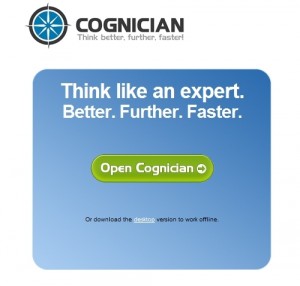We all have them. Those apps we open without thinking. Not because we need anything in particular, but because they feel… safe, in some…
Cognician: A thought is a terrible thing to waste
 The mind is the greatest tool available to man and thoughts and ideas are its most profound expression. One idea could change the entire human race if managed properly. However, a great idea is useless unless you do something with it, and modern society can make it very hard for us to map out our ideas.
The mind is the greatest tool available to man and thoughts and ideas are its most profound expression. One idea could change the entire human race if managed properly. However, a great idea is useless unless you do something with it, and modern society can make it very hard for us to map out our ideas.
Enter Cognician, a software platform and an Adobe Air application designed to organise your thoughts and ideas and create a “user-friendly” guide for your thinking. On Wednesday the site launches a new tool called “The Decision Book“, which aims to assist customers with decision-making.
There are quite a few mind mapping tools available online, but this startup claims to be more than just a mind-mapping tool…it’s a “thought processor”. So instead of just putting down ideas, you actively work on bringing those ideas to life.
Founded by brothers, Barry and Patrick Kayton, the Cape Town based startup is funded by a group of angel investors. Featured as a finalist on Seedcamp 2010, the company seems to be one to watch on the startup landscape. The brothers have been working together for the past 10 years and this is their second venture together. Their design agency, Bright Sparks, has developed educational materials used by children and adults throughout South Africa and worldwide. Cognician is the fruit of their research over the past decade into how to “put ideas into people’s heads”.
The software helps you organise your thoughts and ideas in order to turn them into reality. It turns content into conversations using what the company refers to as “cogs”. These cogs are thinking tools which can be used on the web or downloaded to a desktop, iPhone or iPad.
The Cognician site states that — “cogs are conversational guides made up of a series of concepts that provide an agenda for what to think about. If reading a book is like listening to a monologue, then using a cog is like having a dialogue with the author.”
The idea is to create a dialogue between an expert’s idea and the subject you want to think about. Imagine being able to ask authors questions about a book you are writing, or professors about a research papers.
Patrick Kayton explains: “It’s satnav for the mind. Where satnav provides turn-by-turn navigation for driving, Cognician provides step-by-step guidance for thinking. It systematises thinking by asking you a range of intelligent, thought-provoking questions.
It guides you through complex intellectual tasks that require either critical and systematic thinking or creative, imaginative thinking, or a blend of both. Cognician mimics the workings of an agile mind by allowing you to click your way through the thinking process.”
Cognician has developed content for the Cape Peninsula University of Technology and have also collaborated with the University of Cape Town, and South Africa’s mega-university, UNISA. These and other early adopters such as Old Mutual and The Allan Gray Orbis Foundation are helping to shape the Cognician platform to meet the needs of young entrepreneurs and innovators.
The cog store has a range of cogs for different ideas, such as planning a project, writing a press release or planning a lesson. Most of these cogs are free and the paid ones are priced from US$5 to US$15.
The new “The Decision Book” cog is “the first publisher-owned book in our cog store. The original was a bestseller in German and Profile Books in London has just published the first English edition.
The book is a collection of 50 of the best decision-making models taught on MBA programmes around the world. The cog version brings each of these models to life by allowing you to apply them directly to your own challenges in software,” says Kayton.
You can either register on the site or log on with your already existing Facebook account.
